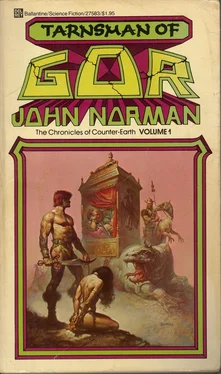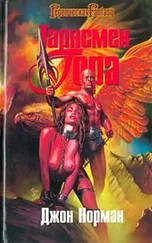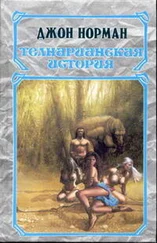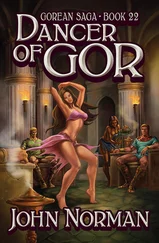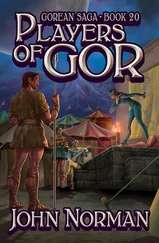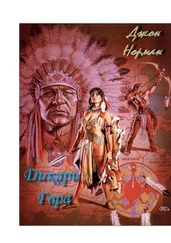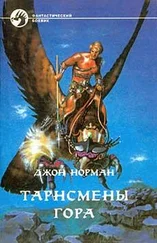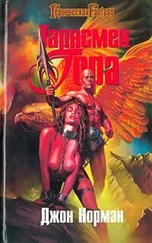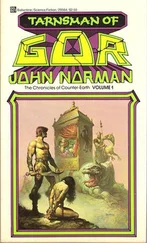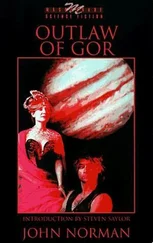In that instant a great black shape hurtled into the fray, and the tarn had met his match. Ripping savagely with his steel-shod talons, slashing with his scimitar like beak, my sable war tam in a matter of seconds left the attacking tam a shuddering heap of feathers. With one of the great steel-shod talons on the body of his fallen foe, my tarn emitted the challenge scream of his kind. The other tarns, poking out of the tarn cot, seemed to hesitate and then to notice the open door into the cylinder.
At that moment, to his own misfortune, a passing guardsman of Ar discovered the opened door that had mysteriously appeared in the wall of the first floor of the Central Cylinder. He stood framed for a moment in the doorway and shouted, a shout half of discovery, half of mortal fear. One of the starved tarns, with a leap and stroke of his wings, lunged upward, catching the man in his beak. The man screamed horribly. Another taro reached the portal and tried to pull the body from the beak of its possessor.
There was another shout from within, and several more guardsmen rushed to the opening. Immediately the hunger-wild tarns surged upward, eager for flesh. The tarns, all of them, entered the cylinder, the palace of Marlenus. In the great hall I could hear the fearful noise of unnatural carnage, the screams of the men, the screams of the tarns, the hiss of arrows. the wild blows of wings and talons. I heard someone shout, a weird, terrified cry, "Taros!" An alarm bar, a hollow metal tube struck by hammers, began to ring in frenzy.
In two or three minutes I led my own tam up the stairs and through the opening. I was sick at the sight that confronted me. Some fifteen tarns were feeding on the remains of a dozen or so guardsmen, detaching and devouring limbs. Several tams were dead; some were flopping about awkwardly on the marble floor, pierced by arrows. There were no living guardsmen in sight. Those who had survived had fled from the room, per haps up the long, wide, circling stairwell that climbed the inside of the cylinder.
Leaving my tarn below, I climbed the stairs, my sword drawn. When I reached that portion of the stairwell adjoining the upper floors, devoted to the private use of the Ubar, I saw some twenty or thirty guardsmen, behind them a barricade of tile and taro wire which they had erected. It was not simply that my sword was drawn. To them, my presence was unauthorized, and my Assassin's garb, far from being a safe-conduct, was an incitement to attack. Some of the guardsmen had undoubtedly fought below with the tarns. They were drenched with sweat; their clothing was torn; their weapons, drawn, were red with blood. They would associate me with the tarn attack. Without waiting to call for my identity or engage in any protocol whatever, they raced toward me.
"Die, Assassin!" one of them screamed, and struck downward with his blade.
I slipped under the blade and ran him through. The others were upon me. Much of what took place then is jumbled in my memory, like the fragments of some bizarre, incomprehensible dream. I remember them pressing downward, so many, and my blade, terrible, moving as if wielded by a god, meeting their steel, cutting its path upward. One man, two, three sprawled down the stairs, and then another and another. I struck and parried and struck again, my sword flashing forth and drinking blood again and again. I seemed to be beside myself and fought as if I might not be what I knew I was, what I thought myself to be — Tarl Cabot, a simple warrior, one man. The thought flamed through me in the violent delirium of battle that in those moments I was many men, an army, that no man could stand against me, that it was not my blade or my heart they faced but something I myself only dimly sensed, something intangible but irresistible, an avalanche, a storm, a force of nature, the destiny of their world, something I could not name but knew in those moments could not be denied or conquered.
Suddenly I stood alone on the stairs, except for the dead. I became dimly aware that I was bleeding from minor cuts in a dozen places.
Slowly I climbed the remainder of the stairs until I came to the barricade which had been erected by the guardsmen. I called out, as loudly as I could, "Marlenus, Ubar of Ar!"
To my joy, from somewhere above, around the curve of the stairs, I heard the voice of the Ubar. "Who would speak with me?"
"Tarl of Bristol," I cried.
There was a silence.
I wiped my sword, sheathed it, and climbed to the top of the barricade. I stood for a moment on the crest of the barricade and then lowered myself down the other side. I slowly walked up the stairs, my hands open, free of weapons. I turned the bend in the stairs and, several yards above me, observed a wide doorway, jammed with chests and furniture. It was behind this makeshift rampart, which could be defended against a hundred men, that I saw the haggard but still blazing eyes of Marlenus. I removed my helmet and set it on the steps. In a moment he had burst through the obstruction as if it had been made of kindling wood.
Wordlessly we embraced
MARLENUS AND HIS MEN AND I raced down the long stairs to the main hall of the Central Cylinder, where we came on the remains of the grisly feast of the tams. The great birds, fed, were once again as tractable as such monsters ever are, and with the tarn-goads Marlenus and his men were again in command. In spite of the urgency of our mission, there was a detail that Marlenus did not neglect. He lifted a tile in the floor of the great hall and revealed a valve; with it, he closed the secret door through which the tarns had come. The secret of the tunnel would be kept.
We led our tarns to one of the large circular ports of the cylinder. I climbed to the saddle of my own sable beast and brought it soaring into the air beyond the cylinder. Marlenus followed, and his men. In a minute we had attained the roof of the Central Cylinder and had all Ar and the surrounding countryside spread beneath us.
Marlenus was, in general, well informed of the political situation; indeed, to be so informed required only the vantage point he had so stoutly defended for several days and a particle of awareness. He swore violently when I told him of the proposed fate of Talena, yet refused to accompany me when I announced that I would attack the Cylinder of Justice.
"Look!" cried Marlenus, pointing below. "The garrison of Pa-Kur is well within the city. The men of Ar discard, their weapons!"
"Will you not try to save your daughter?" I asked.
"Take what men of mine you will," he said. "But I must fight for my city. I am Ubar of Ar, and while I live,my city will not perish." He lowered his helmet onto his head and loosened his shield and spear. "Look for me hereafter in the streets and on the bridges," he said, "on the walls and in the hidden rooms of the highest cylinders. Wherever the free men of Ar retain their weapons, there you will find Marlenus."
I called after him, but his choice, painful though it must have been, had been made. He had brought his tarn to flight and was descending to the streets below to rally the dispirited citizens of Ar, to call them again to arms, to challenge them to renounce the treacherous authority of the self-seeking Initiates, to strike again their blow for freedom, to die rather than yield their city to the foe. One by one, his men followed him, tarnsman by tarnsman. None left the roof of the cylinder to seek his safety beyond the city. Each was determined to die with his Ubar. And I, too, if a higher duty had not called me, might have chosen to follow Marlenus, ruthless Ubar of that vast and violated city.
Once again alone, sick at heart, I loosened my spear and shield in their saddle straps. I entertained no hope now but to die with the girl unjustly condemned on the distant, gleaming tower. I brought the tarn to flight and set its course for the Cylinder of Justice. I noted grimly, as I flew, that large portions of the horde of Pa-Kur were crossing the great bridges over the first ditch and moving toward the city, the sunlight flashing on their weaponry. It seemed that the conditions of surrender meant little to the horde and that it was determined to enter the city, now and in the full panoply of war. By night Ar would be in flames, its coffers broken open, its gold and silver in the bedrolls of the looters, its men slaughtered, its women, stripped, lashed to the pleasure racks of the victors.
Читать дальше
